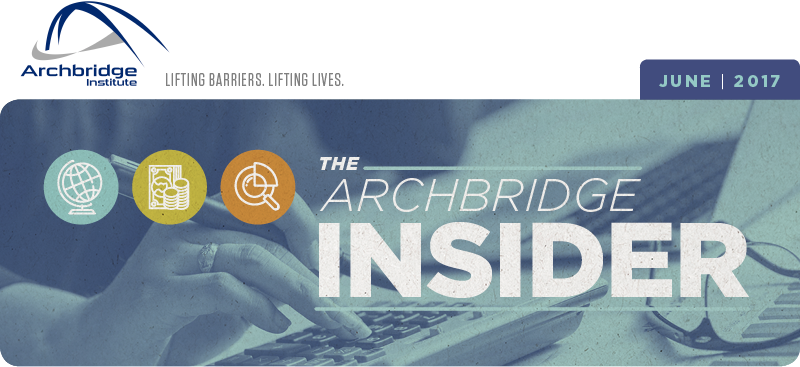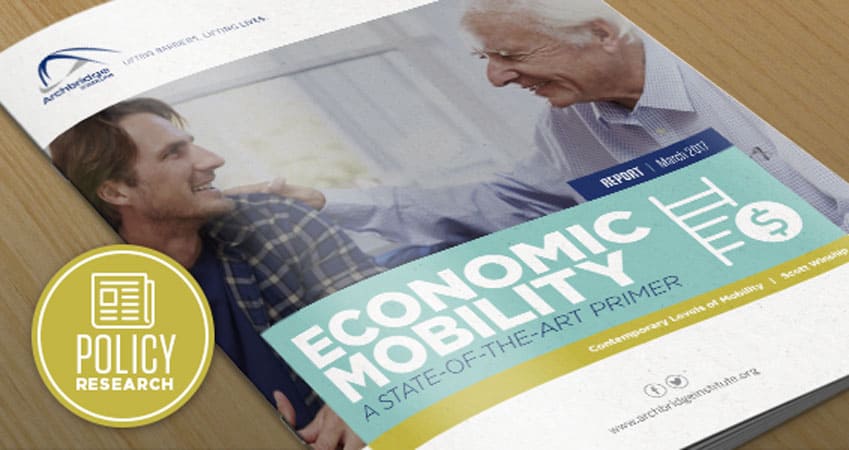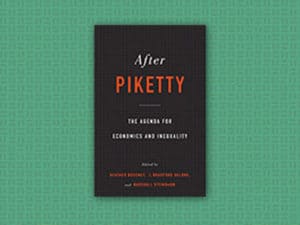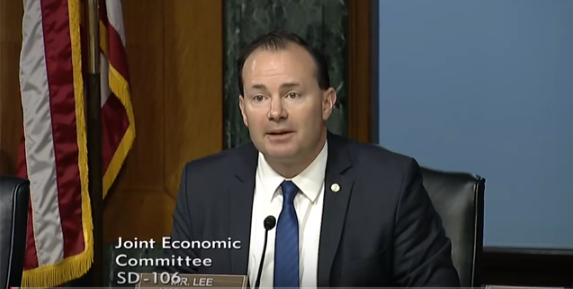
the american dream abides but …
I am pleased to present the first edition of the Archbridge Insider, a monthly newsletter that highlights research, policy, and discussions about social and economic mobility. Today, about three in four children in America are better off than their parents were at the same age–the American Dream may be struggling, but it certainly abides. Nevertheless, this is no excuse to rest easy, too many still face difficult barriers in striving to move up the economic ladder and more barriers are created every day, both in the United States and internationally. At the Archbridge Institute, our mission is to rekindle the American Dream of opportunity and earned success in the United States and around the world by producing, funding, and disseminating multidisciplinary academic and policy research that will inform how to lift barriers that stand in the way of human flourishing.
Although income inequality has become a leading topic of discussion among academics and policy professionals in recent years, there has been too little focus on the more relevant question of how to help people be more economically mobile and be able to climb the income ladder. Part of the problem is that our view of economic mobility, and the forces that help or hinder it, is far from comprehensive. At the Archbridge Institute, we will focus on tackling this problem and focus our work on key structural economic and institutional indicators like rule of law, entrepreneurship, and social capital as well as other indicators that may be outside the field of traditional economics but are closely linked to trends regarding economic mobility. The Archbridge Institute’s work is multidisciplinary, as we believe that an important challenge in the economic mobility debate will be to bridge the gap between different academic disciplines to provide well-interpreted sets of data and meaningful analyses of the cultural and social factors behind economic immobility.
Understanding and increasing levels of economic mobility is the defining issue of our time. As I recently outlined for the intentional giving blog, private philanthropy will be essential to finding solutions that promote economic mobility. I hope you will consider supporting and collaborating with us as we dig deeper into these topics and consider ideas from all academic disciplines and political affiliations. Together we can work to effectively lift barriers to lift lives.
Gonzalo Schwarz
President and CEO | Archbridge Institute

New Research from the Archbridge Institute
To lay the groundwork for this important mission our first research project, Economic Mobility in America: A State-of-the-Art Primer, will be a multi-part series examining the topic. The series is being produced by Archbridge Institute Honorary Advisor, Scott Winship, formerly at the Brookings Institution and the Manhattan Institute and currently leading the project on social capital and mobility for the Congressional Joint Economic Committee.
Winship’s first installment in this Primer, Contemporary Levels of Mobility, is a comprehensive overview of the current levels of economic mobility in the United States as well as an exhaustive overview of previous research and a primer for anyone interested in how to measure and interpret the data. Future installments of the series will compare levels of economic mobility in America to those of our peer nations and examine historic levels of economic mobility in the United States.
Check out Scott Winship’s article in National Review highlighting this new research.
Read the Full Report: Economic Mobility in America
What Others Are Saying …
“There’s plenty more in [Winship’s] paper too, including an analysis of absolute mobility rates by income level, coefficients of intergenerational elasticity, and income-rank associations…Perhaps most interesting, he generates new mobility estimates from correlations of sibling incomes, which we will be writing about soon.” Richard V. Reeves and Dimitrios Halikias, Brookings Institution
“Winship finds that making some adjustments to account for family size, using a more accurate measure of inflation and accounting for transfer programs increases the rate of absolute mobility from the 50 percent reported in the Chetty study to 68 percent.” Charles Hughes, Economics 21
“In a report for the Archbridge Institute, Scott Winship painstakingly analyzes the Panel Study of Income Dynamics (which has been running for nearly half a century), generating a new set of estimates as to just how bad America’s mobility problem has become…Winship’s report doubles as a careful but readable review of the key concepts in this area.” Robert VerBruggen, Institute for Family Studies
American Originals: Walt Disney
From humble beginnings to a household name, the first installment of the American Originals project traces the amazing story of Walt Disney, a true American Original. The grandson of Irish immigrants to Canada, Walt Disney learned at a young age just how far hard work and personal responsibility could take him. Follow his story from illustrating sketches for a dentist, to pioneering entertainment entrepreneur.
American Originals will trace the stories of those who charted their own paths and achieved a better life for themselves and those around them by embracing personal responsibility, hard work, and an entrepreneurial spirit.
Read the Full Story: Walt Disney—An American Original
What We’re Reading

What We Do Together: The State of Associational Life in America
A report prepared by the professional staff of the Joint Economic Committee at the request of Senator Mike Lee.
 What Does Culture Have to Do with the American Dream?
What Does Culture Have to Do with the American Dream?
Commentary from the Institute for Family Studies.

A report from the Economic Innovation Group.

After Piketty: The Agenda for Economics and Inequality
Edited by Heather Boushey, J. Bradford DeLong, and Marshall Steinbaum.
Video Spotlight

On May 17, 2017, Joint Economic Committee Vice Chair Senator Mike Lee, held a hearing entitled “What We Do Together: The State of Social Capital in America.” The hearing explained the decline in American social capital and explored ways in which this phenomenon could be linked to lower rates of economic mobility. Watch the full video on YouTube.


